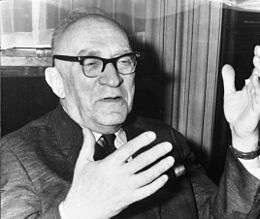Evsei Liberman

Evsei Grigorievich Liberman (Russian: Евсей Григорьевич Либерман, pronounced [jɪfˈsʲej ɡrʲɪˈɡorʲjɪvʲɪtɕ lʲɪbʲɪrˈman]; 2 December 1897, Slavuta, Russian empire – 11 November 1981, Kharkiv) was a Soviet economist who lived in Kharkiv, Ukraine.
He taught at the Kharkov Engineering and Economic Institute, the Kharkiv V.I. Lenin Polytechnic Institute, and the University of Kharkiv.
He proposed new methods of economic planning based on the principles of new democratic centralism. His dissertation took form in "Plan, benefit and prisms" published in Pravda (1962). This became a basis for the Soviet reforms of 1965.
His most outstanding works were "Structure of the balance of an industrial company" (1948), "Means to raise the profitability of the socialist companies" (1956), "Analysis of the use of resources" (1963), "Plan and benefits for the Soviet economy" (1965) and "Planning of the socialism" (1967).
Reforms inspired by Liberman successfully revitalized the Soviet economy during the 1960s. Liberman's reform proposals were also implemented in East Germany. It has been argued that if he had not influenced reform in these countries, the economic situation would have deteriorated drastically, as the standard of living and the economy were stagnating.
Liberman's wife, Regina Horowitz, pianist and pedagogue, was a sister of the famed pianist Vladimir Horowitz. His great-granddaughter, Génia, is also a virtuoso concert pianist.